
Video Of Current Unity
Today I recorded a short screencast that showcases some of the excellent work going into Unity and that is available in the Ubuntu 11.04 Natty Narwhal developer version of Ubuntu.
Check it out:
*Can’t see it? [See it here](https://jonobacon.blip.tv/file/4481516/)*
I will be doing a series of these videocasts throughout the cycle, so expect to see more soon!

Unity: An Ancient African Word Meaning ‘Rocking’
I just wanted to share something with you. This is my desktop today, running on my Natty USB keyring (remember you can play with Natty too from the safety of your keyring by reading [this](https://archivedblog.jonobacon.com/2010/11/30/testing-natty-and-unity-safely-with-a-usb-stick/)):
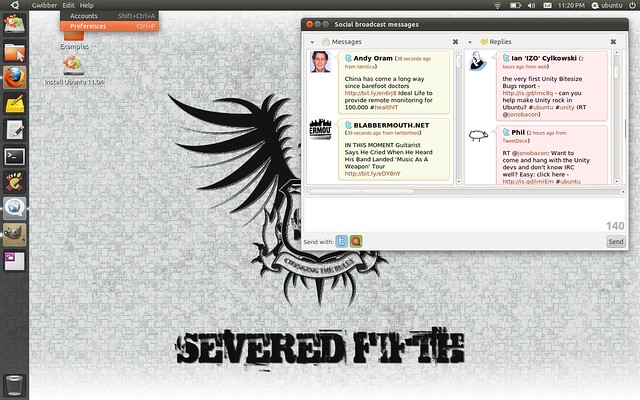
This is [Unity](https://unity.ubuntu.com) running, and a recent addition is *intellihide* in the launcher. This is where the launcher will only show if a window is not obscuring it (just like in GNOME Do). As such, in the screenshot above we can see the launcher as Gwibber is a smaller window, but if I maximize Gwibber so it takes up the full space of the desktop, the launcher slides into the left of the screen so I can access the Gwibber window easily. To then access the launcher I just hover over the Ubuntu button and it slides into view. It looks and feels really fast and sleek. 🙂
Also, the Compiz workspace plugin which is accessible from the launcher, and the Alt-Tab overlay is really slick and fast too. We are just over Alpha 1, and already Unity is feeling 100x times better than in Maverick. I look forward to the missing Unity features (e.g. Places) landing before Alpha 2. 🙂
**Dig Unity? Like to write code? Well, [pick a bug and help us make it better](https://archivedblog.jonobacon.com/2010/12/07/unity-bitesize-bug-report-for-7-december/)!**

Unity Bitesize Bug Report for 7 December
*This is a guest post from Jorge Castro*.
As I mentioned last
week we’ve started a campaign for helping people get started on
fixing bitesize bugs in Unity. Jono blogged
about this as well. As it turns up, we’ve got our first bitesize
contributor today!
Jamal Fanaian has fixed Bug #683241:
Recycle bin icon is empty when there are items in the bin. Jamal
is a developer working on Flickr. He passes along “I love Ubuntu and
open source software, so my only real hobby has become working on open
soruce. Other than that, I like playing with hardware, although
recently I have found less time to do so.”
Basically the trash icon showed up empty even if you had stuff in
it. Jamal first grabbed the code, then fixed the bug, and then
pushed it to launchpad.

Photo by brittav.
From there he submitted
it for review in Launchpad. In this specific example Alex Launi
has started the review process. Now we’re cooking. So, how can you get
started? First let’s have a look at the
list and look at the progress people have made this week.
Bug 677577 – Clicking on a
launcher icon does not raise most recent window- Bug 646740 – indicators are
mis-aligned Bug 683241 – Recycle bin icon
is empty when there are items in the bin- Bug 683466 – There are 2 Quit
menu options in Quicklist - Bug 599716 – having “unity
–replace” would be nice - Bug 681428 – scrolling does not
work on the sound menu – Music lovers everywhere would appreciate
a fix here.
– Fixed!
– Fixed!
New bitesize bugs this week (they might be older bugs but new to
bitesize):
- Bug
686591 – unity-panel-service should be autorestarted by unity when
crashing – A fix for this one would be most welcome, as it’s
annoying! - Bug
677594 – Workspace switcher useless with one workspace - Bug
686182 – Unity launchers run multiple copies of program if clicked
multiple times before the program loads - Bug
599716 – having an unity binary would be nice
– Armor Nick seems to be doing the initial investigation here.
Getting Involved: Instructions for getting started are available
here
For more information check out the wiki page: https://wiki.ubuntu.com/Unity/Bitesize
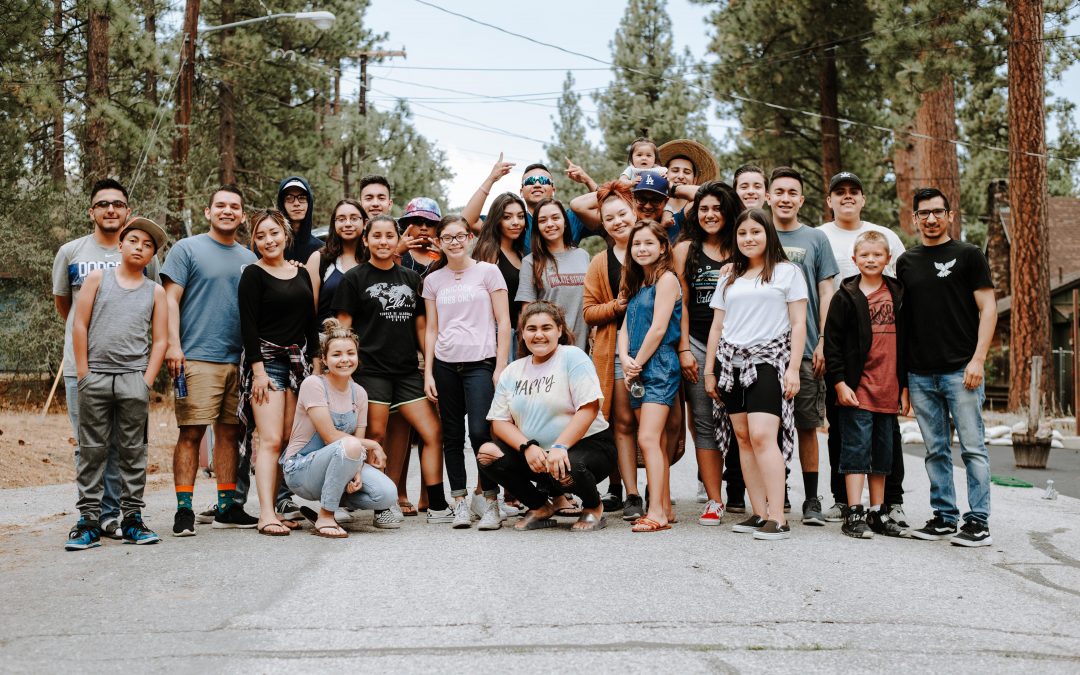
Get Started Hacking On Unity Bitesize Bugs
In this cycle we are taking the stability and maturity of [Unity](https://unity.ubuntu.com) in Ubuntu *very* seriously. We know the move to Unity is a big one, and we want to deliver the *best possible Unity experience* in Natty. Canonical is investing significant resources across the design, desktop experience, and platform teams in making Unity rock, but we can’t do it alone.

*Unity by frerieke available [here](https://www.flickr.com/photos/frerieke/3644112373/sizes/z/)*
Unity is an Open Source project, and like every Open Source project, we need contributions to succeed. We are looking for contributions across a wide variety of different skills from documentation, to accessibility, to translations, and obviously bug fixing.
Today I want to talk about bug fixing. Tomorrow Jorge will be starting a weekly *Bitesize Bug Campaign* in which he will highlight a set of bitesize Unity bugs, that is bugs that only require small and simple fixes (and are ideal for new Unity developers), and work with the community to get those bugs fixed. This campaign is similar to the papercuts effort in that these bugs are rough edges that need sanding off. Jorge will highlight a new set of bugs each week, and he will also highlight those rock stars who contribute these improvements to Unity.
### How To Take Part
Jorge will have more details soon, but it is as simple as this:
1. Make sure you are running Natty (remember, you can [install it and run it from a USB stick](https://archivedblog.jonobacon.com/2010/11/30/testing-natty-and-unity-safely-with-a-usb-stick/))
2. Pick a bug from the list of [Unity Bitesize Bugs](https://bugs.launchpad.net/unity/+bugs?field.tag=bitesize).
3. [Get some info on how to hack on it]() and also get help from the `#ayatana` IRC channel on freenode and the [mailing list](https://www.google.com/url?sa=t&source=web&cd=1&ved=0CBwQFjAA&url=https%3A%2F%2Flaunchpad.net%2F~ayatana&ei=ol79TP2vPIf0tgPi7ey7BA&usg=AFQjCNEBtWQSL9b5umVmJ2fK5JY5MvqV2Q&sig2=Ix3_U5TEIuXTq2TUAsdo5A).
4. Create a fix and submit it!
5. Await the stardom that will result from being so damn incredible. 🙂
I will be talking more about this campaign on my [Weekly Video](https://www.ustream.tv/channel/at-home-with-jono-bacon) that is happening on Wednesday at **11am Pacific / 2pm Eastern / 7pm UTC/UK / 8pm Europe**. Be sure to [tune in](https://www.ustream.tv/channel/at-home-with-jono-bacon)!
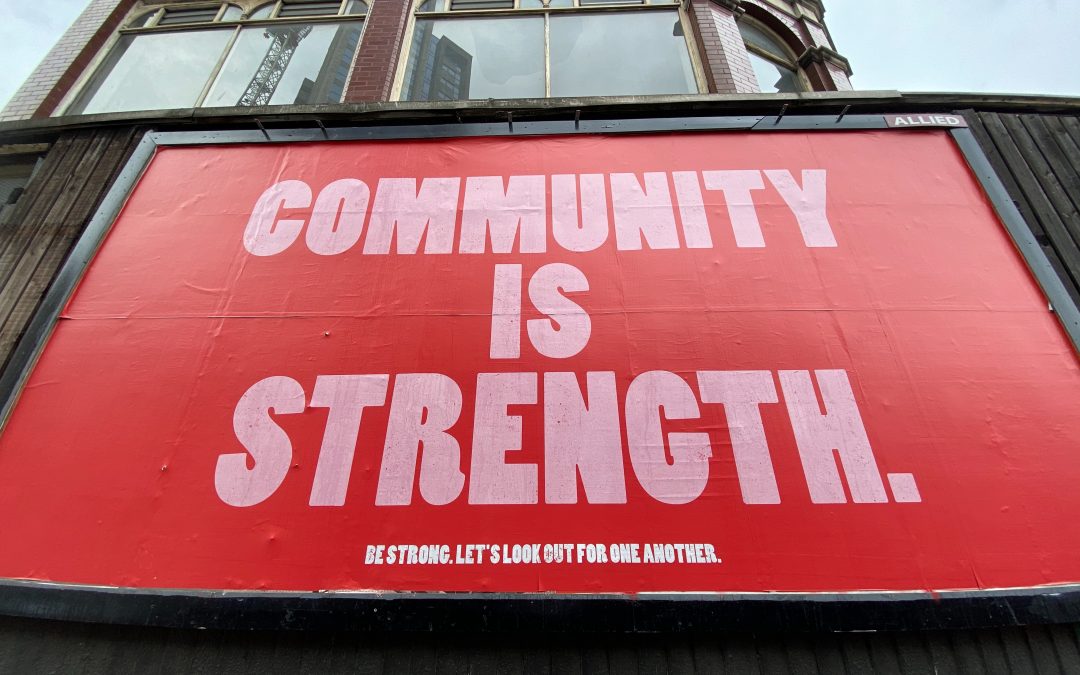
Why It Matters
A few days ago *Phill Whiteside* dropped me a note to let me know about a great example of the Ubuntu ethos alive and working. I just wanted to share it here
[Manuèla Popping](https://wiki.ubuntu.com/hajour) is based in Ureterp, the Netherlands. Phill has been mentoring Manuèla and her contributions to Ubuntu, and she has been contributing to the [Ubuntu Accessibility](https://wiki.ubuntu.com/Accessibility) and [Ubuntu Women teams](https://ubuntu-women.org/).
What I found particularly touching about this story was a poem that Manuèla wrote about her experience of joining the Ubuntu community:
> I came in a community named Ubuntu.
> Unsure if I was good enough to help with anything
> Not really knowing where I ended up.
> There came a blanket of warmth and cordiality to me.
> Caring, social and tolerancity.
> I did not know what came over me
> It was like i was coming home after a long journey
> And warmly was received by family.
Reading this put a huge smile on face. It is exactly this sense of warmth and kindness that I am keen for us to foster in the Ubuntu community; a place where everyone feels welcome, supported and empowered to be successful. Thanks Phill for the note, and thanks Manuèla for the poem! 🙂

Ubuntu 11.04 Alpha 1 Released: Time To Test!
I have talked before how important the Natty cycle is for Ubuntu, particularly with the move to Unity on the desktop. This is an important cycle for us to pull together and hammer on Unity and make sure that all bugs are (a) logged, (b) triaged, and (c) fixed. Fortunately *everyone* can help with either (a), (b), or (c).
Today we [released Ubuntu 11.04 Alpha 1](https://cdimage.ubuntu.com/releases/natty/alpha-1/). For those of you unfamiliar with Alpha releases, they are very early snapshots of the new version of Ubuntu as it matures. This first alpha is the first to have Unity switched on by default, and as such now it is ripe for testing, triaging and fixing. As with every Alpha, remember this is in-development software and is not production ready, but it is an ideal time for testing and reporting bugs so we can make sure that we see steady progress as it matures.
Fortunately this is really easy, and you can test with no risk to your current stable installation of Ubuntu (or whatever other Operating System you have installed), and instead run Ubuntu 11.04 live form a USB keyring. I wrote instructions on how to do this [here](https://archivedblog.jonobacon.com/2010/11/30/testing-natty-and-unity-safely-with-a-usb-stick/). You should then report bugs you find, and instructions for that are [here](https://wiki.ubuntu.com/Unity).
If you good folks can install Alpha 1 to your USB stick and test it and report bugs, that would be an awesome contribution! In addition to this, Jorge will be announcing very soon our Bitesize Bugs campaign to highlight simple bugs that those of you with a coding streak can contribute to fixing. All in all, lots of fun ahead in this cycle! 🙂
So, in summary:
1. [Download Ubuntu 11.04 Alpha 1](https://cdimage.ubuntu.com/releases/natty/alpha-1/)
2. [Install to your USB stick](https://archivedblog.jonobacon.com/2010/11/30/testing-natty-and-unity-safely-with-a-usb-stick/) and report bugs!
3. [Report bugs](https://wiki.ubuntu.com/Unity)!
3. Rock and roll!
🙂
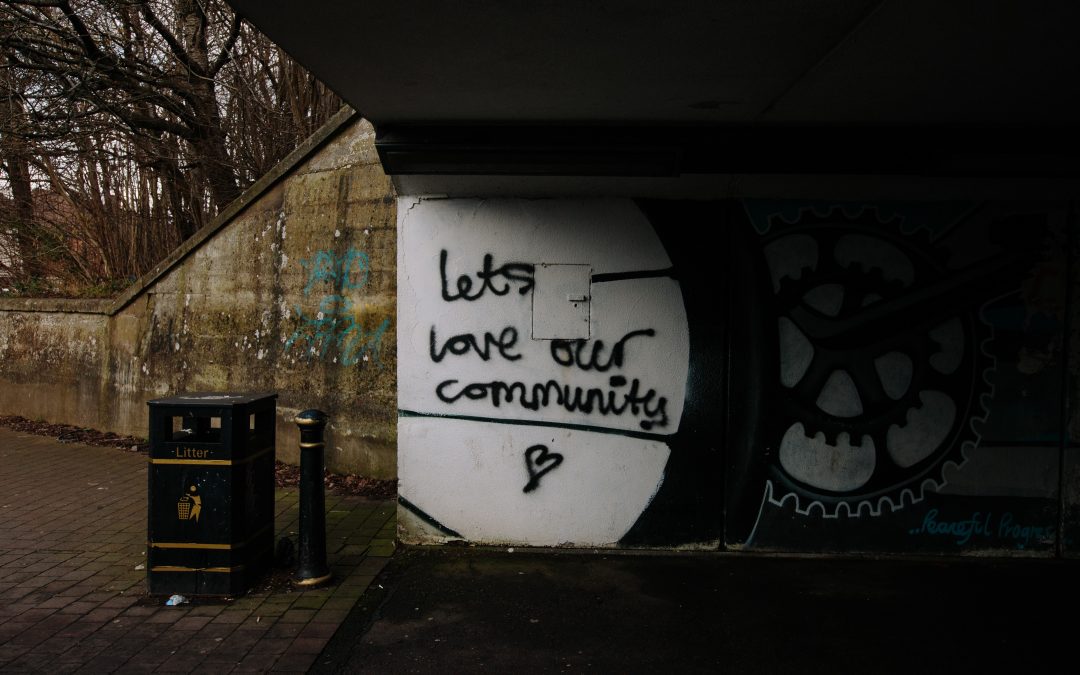
The LoCo Council Optimizes LoCo Teams For Success
For those of you who are interested in Ubuntu, you may be familiar with [LoCo Teams](https://loco.ubuntu.com/). These are Ubuntu user groups based all over the world that advocate Ubuntu, help people with their Ubuntu questions and more. The LoCo community is a fundamental part of the Ubuntu family and they do *incredible* work.
If you want to find a team in your area, see the [LoCo Directory](https://loco.ubuntu.com) and if a team does not exist [create one!](https://wiki.ubuntu.com/LoCoTeamHowto). You can also keep up to date with things going on in the community with the `#locoteams` hashtag and on the [Facebook page](https://www.facebook.com/ubuntulocoteams).
Yesterday I had a call with Laura from the [LoCo Council](https://loco.ubuntu.com/loco-council/) and we talked through much of the fantastic work going on in the community and also some of the blockers. Laura then mentioned something that I wanted to tend to with a blog post. She basically said:
Some people seem to think that a LoCo Team talking to the LoCo Council
is a sign of weakness. We want to change that perception.
I agree with Laura that this is a perception which is unhealthy. I just wanted to share a few words why.
I see the LoCo Council as fulfilling two primary roles in our community:
* **Optimizing teams for success** – the LoCo Council is there to help teams be the most productive, fun, and enjoyable that they can be. The LoCo Council is a resource for providing advice, guidance, helping teams to know what resources and opportunities are available, and more.
* **Helping teams with barriers to success** – all teams face challenges, and the LoCo Council is there to help teams and their leaders scale these challenges and to ensure the team continues to be as successful as possible.
Both of these roles are fundamentally based around helping teams to be *successful*. As such, liaising with the LoCo Council is not evidence of failure, it is instead evidence of a desire to make the team the best it can be – it is evidence of responsibility for your team and the community. I see those who use the LoCo Council for help as *really awesome* contributors who care about their teams. Rock and roll to those people!
I would like to ask all of you who hear this misplaced perception that talking to the LoCo Council is a sign of weakness, to remind folks that taking to the LoCo Council is a *good thing* and not a bad thing. Thanks!

You Know What We Need In The Ubuntu Community?
This [real-time contributions map](https://drupal.org/) shown in the [Drupal](https://drupal.org/) website. It kicks the llama’s ass.
Anyone want to make the love happen?

Testing Natty and Unity Safely With a USB Stick
There is quite the buzz in the community about the new Compiz-driven Unity, and I know many of you are keen to play with it. Of course, do remember that it is *incredibly early* in the cycle and more things are likely to be broken than fixed as the transition is made. Some of you will be bummed out with the [announcement that there will be no Maverick PPA for Unity](https://archivedblog.jonobacon.com/2010/11/18/no-maverick-ppa-for-unity/), but fortunately, it is really easy to try Natty and Unity in a way that won’t involve sacrificing your current stable installation, or even touching your hard drive. You simply install and boot from a USB stick, and I wanted to share how to get this running.
**NOTE**: although Unity has now landed in Natty, some features such as the dash (the Ubuntu button) and the Applications/Files places have not landed yet. They should land ready for Alpha 2.
To do this you will need…wait for it…a USB stick! Get one with at least 2GB of space. Fortunately there are some pretty large USB sticks that are really cheap. In fact many are given out for free at conferences. Just sayin’… 🙂
Just follow these steps to get started:
### Step 1: Download the latest Daily Natty image
Go to [this page](https://cdimages.ubuntu.com/daily-live/current/) and download an ISO for your computer. It should be saved to the `Downloads` directory on your computer.
### Step 2: Create the USB stick installation
Click *Applications -> System -> Startup Disk Creater*. It looks like this:
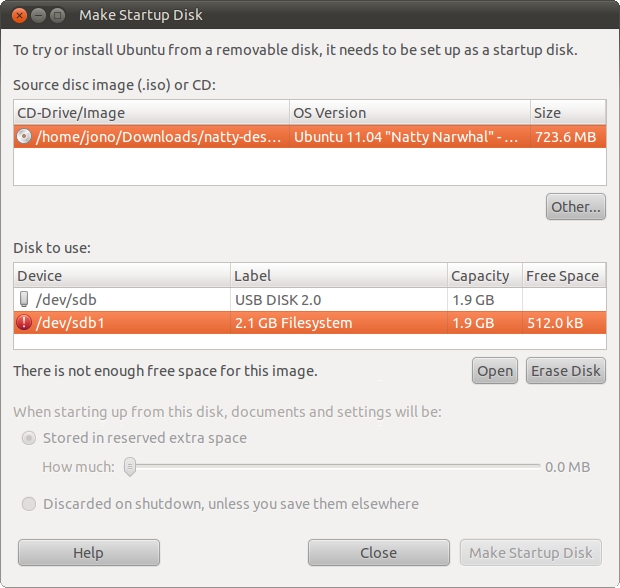
When you start the application, it will likely automatically find the ISO you downloaded, which is displayed in the top pane. If you don’t see it, click the *Other* button and go and select the ISO (typically in your *Downloads/* directory in your home directory).
It is recommended you first erase your USB stick, so select it in the bottom pane and click the *Erase Disk* button. When this is complete, you can then use the slider underneath the *Stored in reserved extra space* slider to select how much disk space can be used for saving files, documents and other things. I personally move the slider all the way to the right to use the maximum space available.
Finally, click the *Make Startup Disk* button and Natty will be installed to your USB stick.
### Step 3: Reboot
Now you need to boot from USB stick. To do this you may need to enter your BIOS to enable your computer to be able to boot from the USB stick. When this is enabled you will typically need to hit a button when you boot to see the BIOS’s boot menu (e.g. on my Thinkpad T400 it is F12) and then you can select the USB drive.
Ubuntu should boot and look and function the same as usual, apart from being much slower as you are running from the USB disk.
### Step 4: Update
Although you installed the latest daily you should ensure it is up to date, and you can do this with:
sudo apt-get update
sudo apt-get upgrade
### Step 5: Test and Report Bugs
Although Natty is still very much in the early stages of development, we want to know when you experience bugs. If we don’t know about the bugs our community can’t fix them!
Many of you will be particularly interested in testing Unity, and we are really keen to hear about bugs and problems in Unity. Filing a bug is simple. Just open a terminal and run:
ubuntu-bug unity
The `ubuntu-bug` program zips up some debugging data from your system and will then fire up a page in your browser where you can enter a bug report. This will then provide details of the problem to the Unity developers to help fix the bug.
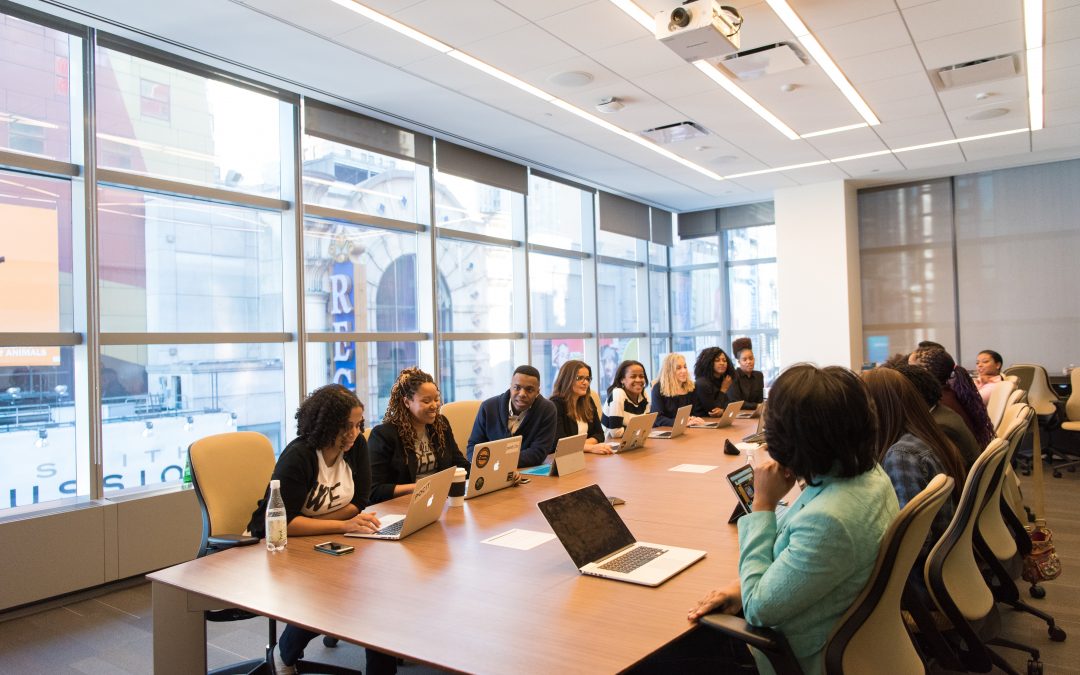
Natty: Off To a Great Start!
A little while back I [blogged about the work planned for Natty in the community team](https://archivedblog.jonobacon.com/2010/11/16/natty-community-team-plans/). I just wanted to provide a quick status update to summarize progress so far in the cycle.
I am pleased to report that the work agreed for delivery in the 11.04 cycle is going well, as can be seen in the [burndown chart](https://people.canonical.com/~pitti/workitems/natty/canonical-community.html):
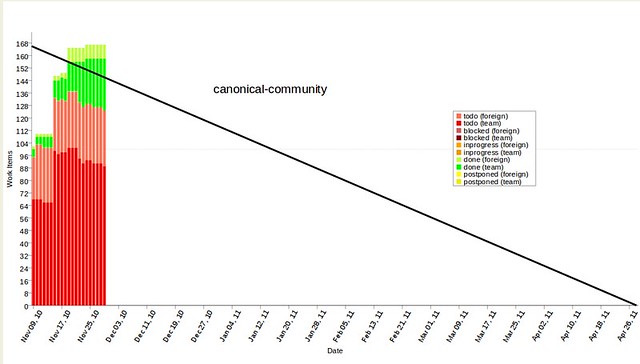
*To read this: the goal is for us to keep the red under the trend line (the thick black line) – this ensures that we are on track in delivering the agreed items by the end of the cycle.*
I just wanted to highlight some of the work that has been going on:
* The cloud community growth is going well. [Ahmed Kamal](https://foss-boss.blogspot.com/) has been blogging up a storm, our new cloud portal will be deployed soon (it is currently waiting on IS), there has been great growth across our [Facebook](https://www.facebook.com/ubuntucloud), [Twitter](https://twitter.com/ubuntucloud), and [identi.ca](https://identi.ca/ubuntucloud) resources, there are now [weekly Ubuntu Cloud meetings](https://wiki.ubuntu.com/UbuntuCloudMeeting) every Wednesday, and Ahmed is starting a series of screencasts, but he [needs your help](https://foss-boss.blogspot.com/2010/11/ubuntu-cloud-screencasts-volunteers.html)!
* Developer outreach is a key focus in this cycle. Daniel has started his [regular series of videocasts](https://daniel.holba.ch/blog/?p=823) and you can see details and a link to a recording of his first one [here](https://daniel.holba.ch/blog/?p=830). We are also seeing excellent growth on our [Facebook](https://www.facebook.com/ubuntudev), [Twitter](https://twitter.com/ubuntudev), and [identi.ca](https://identi.ca/ubuntudev) resources, and work is going on to get a series of tutorial articles prepared so it is even easier to get involved. We have also seen consistant growth in new contributors since 2008, and that growth continues to be consistant. Finally, we have done some work recently to identify those contributors who are providing *significant and sustained* contributions, and I have asked Daniel to each out to them as part of my goals to make Ubuntu more *personal*.
* Horseman Planella and his wonderful traveling translations roadshow has been making great progress on the translations portal, getting the language packs schedule in place, and growth on our [Facebook](https://www.facebook.com/ubuntu.translators), [Twitter](https://twitter.com/ubuntul10n), and [identi.ca](https://identi.ca/ubuntul10n) resources. David is also planning to host some ustream videocasts too: more details soon!
* In this cycle we are determined to get the *Ubuntu Sponsorship Queue* fixed up, and I [blogged recently about the new Patch Pilot scheme](https://archivedblog.jonobacon.com/2010/11/20/new-ubuntu-patch-pilot-scheme/). I am delighted to report that the first week of the new programme has already seen fantastic improvements in the queue, and [Daniel summarized this progress](). This work will continue to ensure that new contributors can get the help and mentoring they need to become Ubuntu contributors quickly and easily.
* Progress on getting Unity in Natty by default has made excellent strides. The [daily live images](https://cdimages.ubuntu.com/daily-live/current/) now have Unity switched on by default thanks to the excellent work of `didrocks` and `seb128`. We are supporting this work throughout this cycle with a bitesize bugs campaign, and this will be launched when we release *Ubuntu 11.04 Alpha 1* on Thursday.
* I have been having some regular calls with the awesome [Ubuntu Accessibility Team](https://wiki.ubuntu.com/Accessibility) and they are making fantastic progress in harnessing the community arounding testing and bug triage, with a particular focus on getting Unity accessible and supporting Luke’s work as he builds this support into the codebase. If you are passionate about Accessibility and want to ensure that Unity has the best possible accessibility experience, check out the [getting started](https://wiki.ubuntu.com/Accessibility/GettingInvolved) page!
* I also have regular calls with [Laura](https://www.lczajkowski.com/) from the [LoCo Council](https://loco.ubuntu.com/loco-council/) and awesome work is going on there in helping to unblock some LoCo Team issues, helping approved LoCo teams to get their banners for shows, and getting ready to make the [Ubuntu Global Jam]() in this cycle rock.
Of course, there has been lots of other fantastic work going on across the team and the community, but I think these summarize some of the key points. Let’s make this cycle rock!
